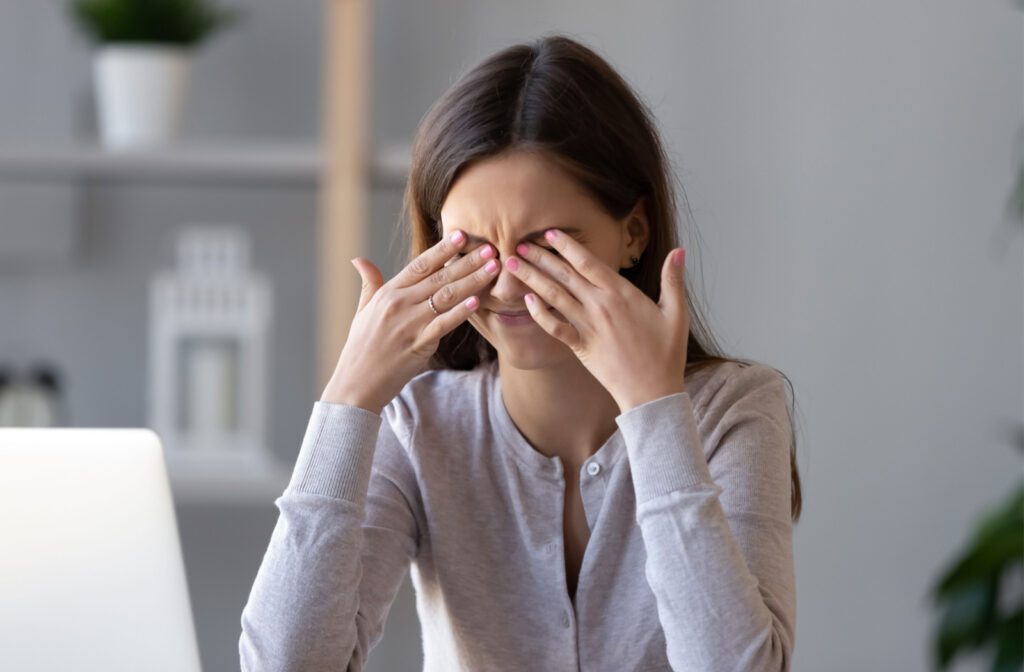As technology continues to play a major role in our daily lives, we often find ourselves glued to our screens for extended periods. Whether for work or entertainment, we simply can’t escape the blue light radiating from our computers, smartphones, and televisions.
Unfortunately, this exposure to blue light can cause dry eye syndrome, a common eye condition affecting millions worldwide.
In recent years, blue light glasses have become increasingly popular as a way to protect our eyes from the effects of prolonged screen exposure. But do these glasses help with dry eyes?
Blue light glasses can help with dry eye syndrome to some extent by improving visual function in patients with tear instability, a common issue in dry eye. However, there isn’t enough evidence available to recommend blue light glasses as a tool to help with the condition.
If you’re experiencing dry eye syndrome, you should book an eye exam with your eye doctor to develop a treatment plan specifically for you.
What is Blue Light?
Blue light is a type of high-energy visible light (HEV) with shorter wavelengths and higher frequencies than other colors in the light spectrum.
Blue light is naturally present in sunlight, but it’s also emitted by electronic devices such as LCD and LED screens, fluorescent bulbs, and digital televisions.
Studies have shown that prolonged exposure to blue light can disrupt our circadian rhythm, suppress melatonin production, and cause eye strain, headaches, and other health issues.
What are Blue Light Glasses?
Blue light glasses, also known as blue light blocking glasses, are eyewear designed to filter out the high-energy blue light emitted by electronic devices. Some blue light glasses have a yellowish tint, which is thought to help reduce eye strain and improve contrast.
They are available in different styles, including prescription or non-prescription lenses, and can be worn during the day or at night, depending on your needs.

Why Do We Need Blue Light Glasses?
We might need or choose to wear blue light glasses because of all the blue light we are exposed to each day in our modern and highly tech-revolved world. Prolonged exposure to blue light from digital screens can lead to eye strain and other issues.
Some studies suggest that the blue light emitted from digital displays may be a factor in digital eye strain. Digital eye strain is a real issue, affecting a significant percentage of digital device users. Symptoms often include dryness, irritation, red eyes, headaches, neck and shoulder pain, and blurred vision.
It’s important to note that while blue light glasses can help mitigate some of the effects of digital eye strain, they’re not a cure-all solution. It’s still important to follow best practices like taking regular breaks from screen time, practicing the 20-20-20 rule (every 20 minutes, look at something 20 feet away for 20 seconds), and ensuring your workspace is ergonomically set up.
Blue Light Effects on Sleep
Blue light affects your sleep by reducing melatonin, the sleep hormone. Blue light glasses, some of which are amber-tinted, can help by blocking blue light, improving sleep quality and mood.
Studies show promising results for improved sleep quality and mood after using blue light glasses before sleeping. A small trial also found that insomniacs wearing these glasses for two hours before bed experienced better sleep.
Can Blue Light Glasses Help with Dry Eyes?
The short answer is yes, blue light glasses can help with dry eyes to some extent. Multiple studies suggest that blue light glasses could help with dry eyes.
A study published in PLOS ONE found that reducing short-wavelength blue light in dry eye patients with unstable tear film improved performance on visual acuity tests. This suggests that blue light glasses, designed to reduce blue light exposure, could potentially improve vision for people with dry eyes.
Another study specifically investigated whether wearing blue light filter lenses improved eye dryness and relieved Computer Vision Syndrome (CVS)-related complaints. They found that twenty dry eye patients reported improvements.
However, it’s also worth noting that some studies found no significant effect of blue light filters on dry eyes. So, while there’s evidence to suggest that blue light glasses can help with dry eyes, more research is needed to understand their benefits fully.
If you suffer from chronic dry eyes, you may need to try other treatments in combination with blue light glasses such as OCuSOFT Retaine eye drops, EyePromise EZ Tears, or lifestyle changes like taking breaks from screen time and staying hydrated.
Blue Light Glasses: A Potential Aid, Not a Cure
Blue light glasses can be a helpful tool for those who suffer from dry eyes. By blocking the harmful blue light that triggers dryness and other symptoms of digital eye strain, these glasses can help alleviate some of the discomfort and improve your overall eye health.
However, it’s important to remember that blue light glasses are not a complete solution for dry eyes. If you experience chronic dry eyes or other eye problems, it’s always best to consult your optometrist at Vision Care Grayslake for a proper diagnosis and treatment plan. Book an appointment to get started.
Meanwhile, using blue light glasses and other eye care practices can go a long way in keeping your eyes healthy and comfortable, even in the age of technology.




